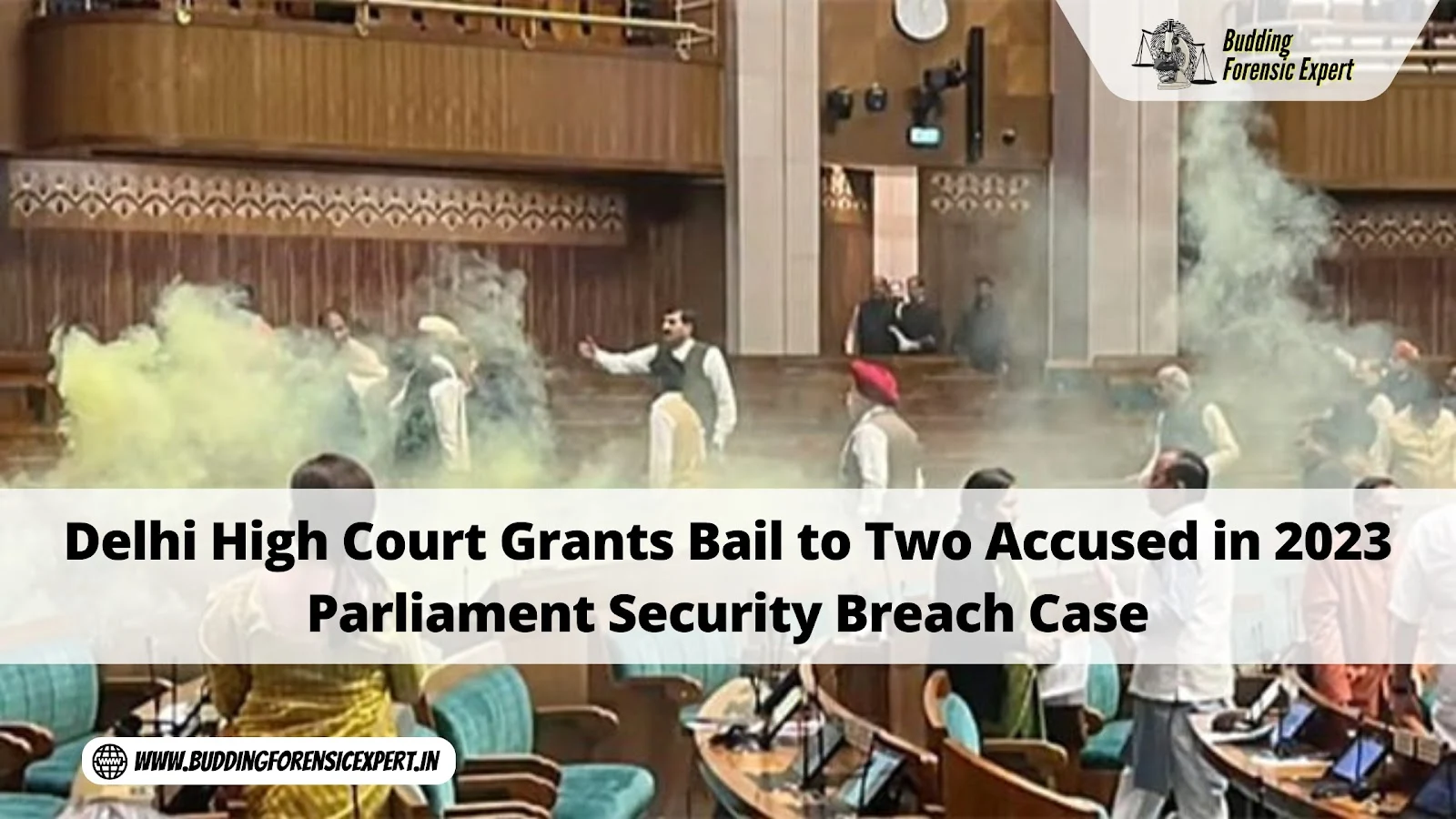Delhi High Court Grants Bail to Two Accused in 2023 Parliament Security Breach Case
New Delhi, India – On July 2, 2025, the Delhi High Court granted bail to Neelam Azad and Mahesh Kumawat, two of the six accused in the 2023 Parliament security breach case, which shook the nation’s capital on December 13, 2023. The division bench, comprising Justices Subramonium Prasad and Harish Vaidyanathan Shankar, approved their release on a personal bond of ₹50,000 each, backed by two sureties of the same amount. The court imposed stringent conditions to ensure compliance with the ongoing investigation, including restrictions on media interactions, mandatory police reporting, and confinement to the National Capital Territory (NCT) of Delhi. This ruling, delivered at approximately 2:45 PM IST, marks a significant development in a case that has raised critical questions about security protocols and the application of anti-terror laws.
Sequence of Events
- December 13, 2023: During Zero Hour in the Lok Sabha session, Sagar Sharma and Manoranjan D jump from the public gallery into the Lok Sabha chamber, release yellow-colored gas from canisters, and shout slogans such as “tanashahi nahi chalegi” (dictatorship won’t work). Simultaneously, Neelam Azad and Amol Shinde spray colored gas outside the Parliament premises, chanting similar slogans. Lalit Jha and Mahesh Kumawat are alleged to have coordinated the act externally. MPs and security personnel subdue Sharma and Manoranjan D, while Azad and Shinde are apprehended outside. Delhi Police recover gas canisters and initiate digital forensic analysis.
- December 14, 2023: An FIR is registered under IPC Sections 186, 353, 452, 153, 34, and 120B, and UAPA Sections 13, 16, and 18. Neelam Azad, Amol Shinde, Sagar Sharma, and Manoranjan D are arrested, followed by Mahesh Kumawat and Lalit Jha.
- January–May 2024: Investigation reveals 18 months of planning via the “Bhagat Singh Fan Club” social media page and Signal app. Forensic analysis confirms non-lethal colored gas in canisters. The Lieutenant Governor grants UAPA prosecution sanction.
- June 7, 2024: Delhi Police file a 1,000-page charge sheet, alleging intent to “discredit Indian democracy.”
- 2024 (Various Dates): Trial court rejects bail pleas for Azad and Kumawat, citing UAPA charges.
- July 2, 2025: Delhi High Court grants bail to Azad and Kumawat, questioning UAPA applicability.
Timeline at a Glance
| Date | Event |
|---|---|
| Dec 13, 2023 | Security breach in Lok Sabha; four accused apprehended on-site. |
| Dec 14, 2023 | FIR filed; Mahesh Kumawat and Lalit Jha arrested. |
| Jan–May 2024 | Investigation uncovers digital evidence; LG sanctions UAPA prosecution. |
| Jun 7, 2024 | 1,000-page charge sheet filed against all six accused. |
| 2024 | Trial court denies bail to Azad and Kumawat. |
| Jul 2, 2025 | Delhi HC grants bail to Azad and Kumawat with strict conditions. |
Forensic Relevance
- Digital Forensics:
- Evidence: Encrypted communications via Signal and “Bhagat Singh Fan Club” page indicate premeditated coordination.
- Significance: Highlights digital forensics’ role in uncovering conspiracies.
- Techniques: Metadata extraction, device forensics, social media analysis.
- Chemical Analysis:
- Evidence: Canisters contained non-lethal colored smoke.
- Significance: Undermined terrorism claims, influencing bail.
- Techniques: Gas chromatography-mass spectrometry (GC-MS).
- Security Audit:
- Issue: Breach exposed flaws in visitor screening.
- Significance: Suggests need for biometric verification, enhanced CCTV.
- Techniques: Analysis of entry logs, surveillance footage.
- Behavioral Analysis:
- Evidence: Ideological motives linked to Bhagat Singh.
- Significance: Profiling could clarify protest vs. terrorist intent.
- Techniques: Analysis of statements, social media, interrogations.
Background of the Case
The incident, on the 22nd anniversary of the 2001 Parliament attack, involved six accused—Sagar Sharma, Manoranjan D, Amol Shinde, Neelam Azad, Mahesh Kumawat, and Lalit Jha—allegedly protesting authoritarianism. Delhi Police invoked UAPA, claiming intent to “strike terror.” The court questioned whether smoke canisters warranted such charges, comparing them to festive events.
Bail Hearing and Detailed Conditions
The bail hearing focused on Neelam Azad’s external protest and Mahesh Kumawat’s coordinating role. The defense argued the lack of violent intent, while the prosecution emphasized psychological impact and timing. The court granted bail due to:
- Prolonged Detention: Over 18 months without trial.
- Evidence Nature: Non-lethal canisters did not fit UAPA’s terrorism definition.
- Proportionality: No physical harm or lethal weapons.
“If using a smoke canister attracts UAPA, then every Holi and IPL match will also attract the offence,” the bench remarked.
Detailed Bail Conditions:
- Financial Obligation: ₹50,000 personal bond with two verified sureties each.
- Media Restrictions: No interviews, press conferences, or social media posts about the case on platforms like X or Instagram.
- Police Reporting: Report to designated police stations every Monday, Wednesday, and Friday at 10:00 AM.
- Geographical Restriction: Cannot leave NCT of Delhi without court permission.
- Non-Interference: No contact with witnesses or evidence tampering.
- Investigation Compliance: Full cooperation with Delhi Police, including for questioning or forensic examinations.
Broader Implications
The ruling has sparked debate over UAPA’s use in protest cases, with critics warning of overreach. It highlights Parliament’s security vulnerabilities, urging forensic audits. The trial will rely on digital and chemical evidence to determine intent.
Conclusion
The Delhi High Court’s bail ruling for Neelam Azad and Mahesh Kumawat underscores judicial scrutiny of UAPA. Forensic evidence will be pivotal in the trial. The case tests India’s legal and security frameworks for democratic institutions.
Sources: India Today, The Economic Times, The Indian Express, LiveLaw, Hindustan Times, ANI, Bar and Bench, July 2, 2025.
This report is prepared by Budding Forensic Expert, dedicated to incisive forensic and criminal justice analysis.




